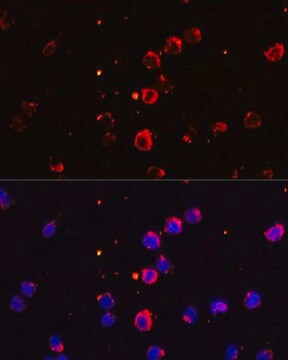SRP3306
SCD40 LIGAND
Animal-component free, recombinant, expressed in E. coli, ≥98% (SDS-PAGE), ≥98% (HPLC)
Synonim(y):
CD154, TNFSF5, TRAP, gp39
Zaloguj sięWyświetlanie cen organizacyjnych i kontraktowych
About This Item
Kod UNSPSC:
12352200
NACRES:
NA.77
Polecane produkty
pochodzenie biologiczne
human
rekombinowane
expressed in E. coli
Próba
≥98% (HPLC)
≥98% (SDS-PAGE)
Postać
lyophilized
siła działania
5-10 ng/mL ED50
masa cząsteczkowa
16.3 kDa
opakowanie
pkg of 50 μg
zanieczyszczenia
endotoxin, tested
numer dostępu UniProt
Warunki transportu
wet ice
temp. przechowywania
−20°C
informacje o genach
human ... TNFSF5(959)
Opis ogólny
CD40, a member of the TNF receptor superfamily, is a cell surface protein expressed on B cells, dendritic cells, monocytes, thymic epithelial cells and, at low levels, on T cells. Signaling though CD40 plays an important role in the proliferation and differentiation of B cells, and is critical for immunoglobulin (Ig) class switching. The membrane-anchored CD40-Ligand is expressed almost exclusively on activated CD4+ T lymphocytes. Failure to express CD40L leads to “immunodeficiency with hyper-IgM”, a disease characterized by failure to produce IgG, IgA and IgE. The human CD40L gene codes for a 261 amino acid type II transmembrane protein, which contains a 22 amino acid cytoplasmic domain, a 24 amino acid transmembrane domain, and a 215 amino acid extracellular domain. The soluble form of CD40L is an 18 kDa protein comprising the entire TNF homologous region of CD40L and is generated in vivo by an intracellular proteolytic processing of the full length CD40L. Recombinant human soluble CD40 ligand is a 16.3 kDa protein containing 149 amino acid residues comprising the receptor binding TNF-like domain of CD40L.
Działania biochem./fizjol.
CD40, a member of the TNF receptor superfamily, is a cell surface protein expressed on B cells, dendritic cells, monocytes, thymic epithelial cells and, at low levels, on T cells. The soluble form of CD40L is an 18 kDa protein comprising the entire TNF homologous region of CD40L and is generated in vivo by an intracellular proteolytic processing of the full length CD40L. Recombinant human soluble CD40 ligand is a 16.3 kDa protein containing 149 amino acid residues comprising the receptor binding TNF-like domain of CD40L.
Postać fizyczna
Lyophilized from 10mM Sodium Phosphate, pH 7.5.
Rekonstytucja
Centrifuge the vial prior to opening. Reconstitute in water to a concentration of 0.1-1.0 mg/ml. Do not vortex. This solution can be stored at 2-8°C for up to 1 week. For extended storage, it is recommended to further dilute in a buffer containing a carrier protein (example 0.1% BSA) and store in working aliquots at -20°C to -80°C.
Ta strona może zawierać tekst przetłumaczony maszynowo.
Kod klasy składowania
11 - Combustible Solids
Klasa zagrożenia wodnego (WGK)
WGK 3
Temperatura zapłonu (°F)
Not applicable
Temperatura zapłonu (°C)
Not applicable
Certyfikaty analizy (CoA)
Poszukaj Certyfikaty analizy (CoA), wpisując numer partii/serii produktów. Numery serii i partii można znaleźć na etykiecie produktu po słowach „seria” lub „partia”.
Masz już ten produkt?
Dokumenty związane z niedawno zakupionymi produktami zostały zamieszczone w Bibliotece dokumentów.
Contribution of surface localization to platelet activation by CD154 antibodies and introduction of a novel approach for studying immune complex activity.
Meghan Hatfield et al.
Thrombosis research, 127(6), 571-575 (2010-01-20)
D Hollenbaugh et al.
The EMBO journal, 11(12), 4313-4321 (1992-12-01)
Signals delivered to B cells via CD40 can synergize with those provided by other B cell surface receptors to induce B cell proliferation and antibody class switching as well as modulate cytokine production and cell adhesion. Recently, it has been
Nasz zespół naukowców ma doświadczenie we wszystkich obszarach badań, w tym w naukach przyrodniczych, materiałoznawstwie, syntezie chemicznej, chromatografii, analityce i wielu innych dziedzinach.
Skontaktuj się z zespołem ds. pomocy technicznej